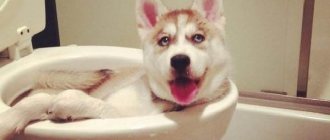What to do if your puppy cries at night
There is no use in tearing out your hair. It's better to make an action plan. Perhaps our advice will help you. On a scale of 10, how hard is raising a small puppy? Many answer: “11 points.” But there is good news: it will soon become easier, and your hard work will pay off in a big way. Many dog owners compare raising puppies to caring for a baby, and they are right.; This article is dedicated to all puppy owners whose pet cries at night or does not want to fall asleep at all.
Needing Attention Often puppy owners complain about the following situation: the puppy falls asleep in the evening, but in the middle of the night wakes up and whines, whines, whines, refusing to lie down. Sometimes this continues for several nights in a row, and drives the owners into a frenzy. What can be done?
The puppy's place (bed or crate) should be located where the animal can see everything that is happening in the room, and at the same time he will have the opportunity to rest quietly (for example, a corner of the room). The place should be equipped with a comfortable bed. Place a chew toy there and a bowl of water.
If the puppy sleeps in a crate, partially cover it to create the equivalent of a “cave.” Never use your puppy's bed or crate as a punishment area. Place treats there during the day to let your puppy know what a wonderful place it is. A whining puppy should be ignored; otherwise, you are encouraging undesirable behavior. The puppy concludes: Crying + I get attention = crying allows you to get the attention of the owner. If you then decide to raise your puppy by ignoring his crying and whining, he will decide that he was not heard and will cry even louder. This may continue for several days. There is only one solution: don’t despair, continue your line of behavior (ignore).
And remember: on the puppy’s first night in his new home, he will not let anyone sleep until he falls asleep himself.
How to teach a puppy to calm down
- First of all, the puppy must learn to be alone. Leave him alone in the room periodically throughout the day (immediately after he goes to the toilet).
- Stick to a specific daily routine. Make sure he plays a lot in the evening and is tired. Take him outside for a while, then say, “It's time for bed,” and leave the room.
- A puppy's bladder can withstand as many hours without walking as the puppy is months old (the rule works until the animal is 6 months old). Thus, a three-month-old puppy can tolerate 3 hours, a little longer at night. If the puppy went to bed at 10 pm, wake him up at 1 or 2 am to take him to the toilet, and then at 4 or 5 am.
- When your puppy wakes up to go to the toilet, do not talk to him or turn on the light. Pick him up from his bed, take him to the place you use as a toilet, wait until he does his business, and without saying a word, take him back to his place. This will help him understand that bedtime is still ongoing. If he whines between these trips, you can safely ignore him, because you will know for sure that he does not need to go to the toilet.
- Teach your puppy to play with chew toys. There are special toys in which you can put some food, and by chewing the toy, the puppy will be able to get it. Give your puppy a safe toy to chew at night to help him calm down.
- You can purchase a special diffuser in pet stores (for example, Adaptil brand). It emits pheromones with the same odor that comes from a nursing dog. This will help the puppy feel safe.
An effective method if the dog is afraid to be left at home alone
One effective method if a dog is afraid to be left at home alone is to pour cold water over it. If the barking is unreasonable and long, you need to take a glass of water and throw half of it on the dog. Place the remaining half a glass of water in plain sight. The main hope is that the dog will understand why there is water in the glass. The method is suitable for puppies that are too active and fearless; for timid and calm ones, it may not be suitable; the dog will simply be very scared, and in the future will tremble only at the sight of the owner with a glass in his hand.
The puppy may be dissatisfied with something and express his dissatisfaction with a loud, sometimes shrill bark. Some owners like it, but don't think about the time it takes for the puppy to grow up. That is why you should teach your dog to be quiet, as he will find many reasons to bark, it’s just a matter of the dog’s ingenuity and intelligence. This could be the noise of an elevator, steps on the landing, a doorbell or intercom signal, being left tied on the street, or something interesting seen from a window or balcony. And if your dog has an explosive temperament and strong vocal cords, he can happily bark for many hours.
How to help a puppy or teach him not to cry when he's locked up or outside
I've encountered this. It's been a long time, really. The puppy cried terribly the first day, I gave him my old rabbit fur hat. He probably thought it was still a puppy and didn’t cry anymore. Maybe I should give him something fur too? :))
Let's try to find some kind of fur trap.
You can also try leaving for a few minutes and returning, each time increasing the time of absence - so that he understands that you are not leaving him and will definitely come soon. Absolutely right. Or - get dressed and NOT leave. Lock yourself away from him in the room/kitchen, scold him if he cries, scratch him, praise him if he was silent and didn’t ask. Praise + treat if you were silent for at least a minute or two. Then increase the time. Everything else is also an option, try it.
Why do dogs or puppies whine?
If you are faced with a dog whining problem, it is actually absolutely not difficult to stop your dog from howling and whining. But to achieve a positive result, you need to find out the reason why your beloved pet is whining.
Important! Barking, howling, whining, and other sounds are special means of communication through which a dog conveys its emotions and mood.
Causes of dog whining:
- nervousness, impatience;
- emotional overexcitation;
- fear, fright, severe stress;
- joy, delight
- to attract attention;
- loneliness;
- pain, discomfort (heat, cold);
- feeling of guilt, apology for the wrongdoing;
- unrealized, overflowing energy;
- reaction to certain stimuli.
As a rule, the most common whining is from small puppies that have been separated from their littermates and their mother dog. So they call on the mother. Therefore, be prepared for the fact that the first time after your baby arrives in your house, the baby will whine, especially at night or when the dog is left alone in the house.
This behavior is explained by the fact that the small pet has not yet adapted and is not accustomed to the new conditions. Time will pass, the dog will get used to the members of his family, and will not disturb you with such unpleasant sounds.
Important! Surround the puppy with attention and care, devote more time to the dog, and do not leave it alone for a long time.
Often the causes of whining are purely physiological in nature:
- Dogs are quite inquisitive and impatient animals, so they whine before eating, begging you for a treat or asking for a walk, especially in the morning.
- The dog whines if he “needs” to go to the toilet, for example, due to an upset stomach. In this way, he informs the owner about his physiological desires.
- Puppies and young dogs often whine due to acute pain if they experience severe discomfort or are very frightened by something.
Education methods
Some trainers advise punishing a dog for breaking silence by saying “ugh!” in a threatening tone, and repeating this action until progress is made. Others insist that punishment in this case is ineffective. It will be much more effective, on the contrary, to encourage her good behavior and praise her for maintaining silence.
If the dog begins to whine when the owner moves out of sight, it is necessary to accustom him to his absence. To do this, you need to make her understand that when a person leaves, he will definitely return. The best way is to lock your pet in the room, leaving it alone for 10 minutes, and praise it if it doesn’t start whining during this time. Next, you need to increase the time of absence, bringing it to an hour. The dog will develop a strong understanding: the owner will return.
If the reason lies in the stress of the animal, it is worth providing support, surrounding it with care and increased attention in order to quickly calm it down and make it clear that everything is fine. Play with him, give him a treat.
If in your case we are talking about a young puppy, you need to help him adapt to a new place, get used to new people, praise him more often for good behavior, be patient with the emotions and fears he experiences, spend time with him more often, and show care.
What to do if your dog whines at night
As a rule, adult dogs sleep at night if their day has been eventful and active, the pet is well-fed and healthy. Therefore, most often small puppies make cutting, unpleasant sounds at night, and this is most often explained not only by a sharp change in their usual environment, but also by fear and loneliness.
Important! If the puppy is not yet three months old, the baby howls and whines at night when he is left alone or locked alone in a room, never use physical violence or yell at the small pet. But encouraging such behavior is unacceptable. Act consistently and persistently.
During the first few days, whining is quite normal. He is frightened by new surroundings, smells, sounds. Some dog breeders recommend taking your pet to the bed. But dog experts do not recommend doing this. The puppy will get used to sleeping with you and it will be difficult to accustom an older pet to a place.
To stop your puppy from whining:
- Organize a comfortable bed or house for the new member of your family.
- If possible, do not leave the dog alone for a long time, and especially do not lock the puppy in a crate or in another room.
- Protect your dog from stress and negative emotions. The period of adaptation and socialization should be as calm and favorable as possible.
If the puppy is a little over a month old, at this age it is not advisable to separate him from his mother. But if this happens, place the dog bed near your bed and as soon as the baby whines, calm him down and pet him. Once the puppy calms down, praise him.
Gradually move the lounger further away from the bed and react less to whining. Pay more attention to your pet so that he gets used to his new home faster and can more easily endure separation from his mother. In order for the puppy to better cope with separation from his mother dog, ask the breeders for toys, a cloth, or things that have retained familiar smells . Place them near the bed or in the house where your small pet sleeps, and he will behave more confidently and calmly. You can also use a heating pad or a bottle filled with warm water. Wrap it in soft cloth and place it near the puppy.
If the puppy, having adapted to new conditions, continues to howl and whine at night, leave the light or night lamp on. Approach the dog and calm it down in a gentle tone. If the whining does not stop, perhaps the puppy does not want to sleep and is bored. Place toys and tooth sharpeners near the baby. After playing enough, the dog will get tired and sleep peacefully.
Gradually accustom your dog to the command “Place”, “Fu”, “No” or any other prohibition commands. Give the command in a strict tone, and as soon as the dog has shown obedience, reward it with a gentle intonation or a treat. To prevent the puppy from getting bored when you are not at home, leave him various toys. Otherwise, the dog will not only howl, but will also begin to damage furniture and wallpaper.
Physical activity is equally important. After quarantine, walk your dog several times a day, gradually increasing the walking time. Accustom your puppy to communicate with his relatives, so that he then reacts normally to other dogs and animals.
The dog whines in the absence of its owners
There is nothing worse when a dog howls or whines under the doors, throws tantrums when he is left alone at home. The problem needs to be solved gradually.
To begin with, you can teach him to lock the dog in one of the rooms. Close the door and don't pay attention if he scratches the door or whines. After a while, open the door, scold your pet and give the forbidden command in a stern tone. You can lightly lift your pet by the scruff of the neck and slap him on the rump with a newspaper.
Once the dog calms down, praise him. Don't constantly run to your dog when he starts to tantrum and don't teach him to reward him with treats. The dog will quickly understand that whining is an effective means of attracting attention and getting treats. Repeat the exercise several times a day, increasing the time amplitude until you achieve results. If the dog starts whining as soon as you leave the house, come back and scold the dog. Give the command “Get in place!” and take him to the litter.
Advice! Do not let your dog out of the house or enclosure for a walk if the dog begins to howl. Don't open the door if he scratches or whines. Don't follow the animal's lead.
Do the same when leaving home. So that the dog doesn't get bored:
- Leave a bone, toys, teeth sharpeners.
- Before leaving, organize a long active walk and engage in training.
- Feed before leaving. A tired and well-fed dog will sleep and rest when you leave home.
- When leaving the dog alone, give the command “Place”. As soon as your pet goes to his bed, reward him.
The puppy promises when he sits in another room
If the puppy has become accustomed to you and its new habitat, but continues to disturb you or makes heart-rending sounds when locked in another room, you need to be strict in your upbringing. If you constantly indulge in such behavior, pity or calm the dog, whining will become a habit, and the dog will howl for any reason.
You can ignore whining if this is how your pet attracts attention. Over time, the dog will understand that such behavior only displeases the owners. If the whining really bothers you, open the door. In a stern tone, send the dog to its place, give the command “Fu.” Repeat similar actions until the dog calms down. If all else fails, the dog continues to howl as soon as you close the door, increase the punishment, find a method that will achieve results.










